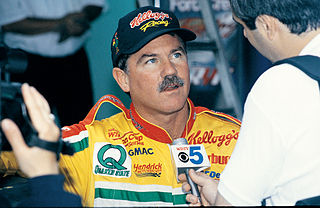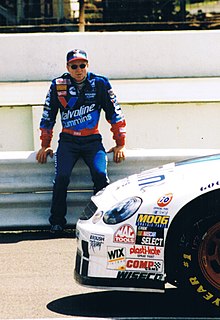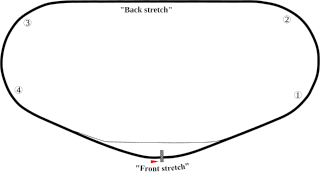The 2004 NASCAR Nextel Cup season was the 56th season of professional stock car racing in the United States and the 33rd modern-era Cup series season. The season began on Saturday, February 7, and ended on Sunday, November 21. Kurt Busch with Roush Racing driving a Ford was the Nextel Cup champion.
The 2002 NASCAR Winston Cup Series is the 54th season of professional stock car racing in the United States and the 31st modern era Cup Series season. It began on February 10, 2002 at Daytona International Speedway, and ended on November 17, 2002 at Homestead-Miami Speedway. Tony Stewart, driving for Joe Gibbs Racing, was declared as the Winston Cup champion. Bill Elliott won the 2002 NASCAR's Most Popular Driver Award. He would win it for the 16th and final time in his career. He withdrew from the ballot after receiving the award. The NASCAR Manufacturers' Championship was captured by Ford after winning 14 events and gaining 245 points over second-place finisher Chevrolet, who had 10 wins and 211 points.

The 1998 NASCAR Winston Cup Series season was the 50th season of professional stock car racing in the United States and the 27th modern-era cup series. The season included 33 races and three exhibition races, beginning with the Daytona 500 at Daytona International Speedway and ending with the NAPA 500 at Atlanta Motor Speedway. Jeff Gordon won the Driver's Championship, the third of his career and his third in the last four seasons.

The 1999 NASCAR Winston Cup Series was the 51st season of professional Stock car racing in the United States, the 28th modern-era Cup series, and the last Cup season of the 1990s, the 20th century's final decade. The season began on Sunday, February 7, and ended on Sunday, November 21. Dale Jarrett, representing Robert Yates Racing, was crowned the champion, while the NASCAR Manufacturers' Championship was won by the Ford drivers with 13 wins and 231 points over second place Chevrolet who had 12 wins and 210 points.
The 2000 NASCAR Winston Cup Season was the 52nd season of professional stock car racing in the United States, the 29th modern-era Cup series, and the last Cup series of the 20th century. The season began on February 13 and ended on November 20. Joe Gibbs Racing driver Bobby Labonte was crowned champion at season's end. The NASCAR Manufacturers' Championship was won by Ford when they captured 14 wins and 234 points to better Pontiac's 11 wins and 213 points. Chevrolet finished third with nine wins and 199 points.

The 1999 NASCAR Busch Series season began on February 13 and ended on November 13. Dale Earnhardt Jr. of Dale Earnhardt, Inc. won the season points championship for the second year in a row.

The 1997 NASCAR Winston Cup Series season was the 49th season of professional stock car racing in the United States and the 26th modern era NASCAR Cup series. It began on February 9 and ended on November 16. Jeff Gordon of Hendrick Motorsports won his second Cup championship at the end of the season.

The 1998 NASCAR Busch Series season began on Saturday February 14 and ended on Sunday November 15. Dale Earnhardt Jr. of Dale Earnhardt, Inc. was crowned champion at season's end.

The 1996 NASCAR Winston Cup Series was the 48th season of professional stock car racing in the United States and the 25th modern era NASCAR Cup series. The season had been started on February 18 at Daytona International Speedway, and ended on November 10 at the Atlanta Motor Speedway. The season would be remembered as Terry Labonte pulling off a massive upset and winning his second championship.
The 2001 NASCAR Winston Cup season was the 53rd season of professional stock car racing in the United States, the 30th modern-era Cup series, and the first Cup season of the 21st century and the third millennium. It began on February 11, 2001, at Daytona International Speedway and ended on November 23, 2001, at New Hampshire International Speedway. Jeff Gordon of Hendrick Motorsports was declared as the series champion for the fourth time in seven years.

The 1997 NASCAR Busch Series season began February 15 and ended November 9. Randy LaJoie of BACE Motorsports won the championship.

The 1996 NASCAR Busch Series season began February 17 and ended November 3. Randy LaJoie of BACE Motorsports was crowned the series champion.

The 1993 NASCAR Busch Series season began February 13 and ended November 13, with Steve Grissom of Grissom Racing Enterprises winning the championship.

The seventeenth year of IROC competition took place in 1993. IROC XVII was the fourth and final year the Dodge Daytona was used in competition, and continued the format introduced in IROC VIII. Race one took place on the Daytona International Speedway, race two took place at Darlington Raceway, race three was held at Talladega Superspeedway, and race four ran at Michigan International Speedway. Davey Allison won the series championship posthumously after being killed in a helicopter accident at the Talladega Superspeedway. With only one race remaining, Terry Labonte drove the final race, and the points from that race, applied to Allison's previous total, were enough to secure the championship. The winnings of $175,000 were placed in a trust fund for Allison's children.

The eighteenth year of IROC competition took place in 1994. IROC XVIII was the first year the Dodge Avenger was used in competition, replacing the Dodge Daytona, and continued the format introduced in IROC XVIII. Race one took place on the Daytona International Speedway, race two took place at Darlington Raceway, race three ran at Talladega Superspeedway, and the year finished at Michigan International Speedway. Mark Martin won the series championship, and took home $200,000 for his efforts.

The nineteenth year of IROC competition took place in 1995. IROC XIX was the second and final year the Dodge Avenger was used in competition, and continued the format introduced in IROC XVIII. Race one took place on the Daytona International Speedway, race two took place at Darlington Raceway, race three ran at Talladega Superspeedway, and the year finished at Michigan International Speedway. Dale Earnhardt won his second series championship, and took home $225,000 for his efforts.

The 25th season of the True Value International Race of Champions began on Friday, February 16, 2001 at Daytona International Speedway. The initial roster included 12 drivers from four separate Racing Leagues. However, after the first race, the series continued with only eleven drivers as a result of the death of Dale Earnhardt in the Daytona 500 two days later.

The twentieth season of IROC competition started on February 16, 1996. IROC XX was the first year that the Pontiac Firebird Trans Am was used in competition, and contested races at Daytona International Speedway, Talladega Superspeedway, Charlotte Motor Speedway, and Michigan International Speedway. Mark Martin won the first night race in the history of the series in race three at Charlotte Motor Speedway, and won again in the season finale at Michigan International Speedway propelling him to a come-from-behind IROC championship, his second in three seasons.

The twenty-first season of the International Race of Champions started on February 17, 1997. The series used identically prepared Pontiac Firebird Trans Am race cars, and contested races at Daytona International Speedway, Charlotte Motor Speedway, California Speedway, and Michigan International Speedway. Mark Martin won the IROC championship, his second straight and third in four seasons.

The twenty-fourth season of the International Race of Champions started on February 18, 2000. The series used identically prepared Pontiac Firebird Trans Am race cars, and contested races at Daytona International Speedway, Talladega Superspeedway, Michigan International Speedway, and Indianapolis Motor Speedway. Dale Earnhardt won his second consecutive championship, and his fourth and final overall.


















